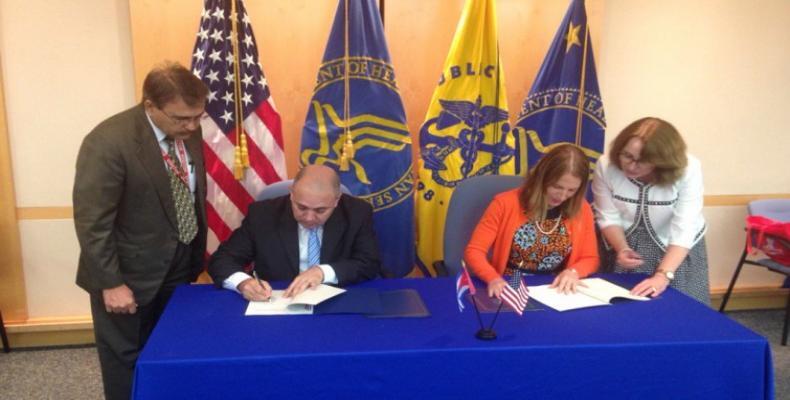Washington, June 15 (RHC)-- Cuban and U.S. health authorities signed an unprecedented memorandum of understanding earlier this week to cooperate in combating diseases affecting the two neighboring countries.
The agreement, signed in Washington by the U.S. Department of Health and Human Services (HHS) and Cuba’s Ministry of Public Health, opens the way to coordinate actions across a wide range of issues such as global security, communicable and non-communicable diseases, research and development, and information technology.
According to a HHS press release, both countries “share an interest in detecting and responding to emerging infectious diseases such as dengue and chikungunya, serious mosquito-borne viral diseases. Both countries also have an aging population, necessitating an increased focus on responding to the increasing burden of neuro-degenerative and non-communicable diseases, including cancer.”
U.S. Secretary of Health and Human Services. Sylvia Mathews Burwell noted: “Cuba has made significant contributions to health and science, as evidenced by their contribution to the Ebola response in West Africa and becoming the first country to eliminate mother-to-child HIV transmission.”
She added that, “This new collaboration is a historic opportunity for two nations to build on each other’s knowledge and experience, and benefit biomedical research and public health at large.”
According to an article in the Huffington Post, combating the Zika virus is another area covered in the memorandum of understanding signed on Monday, June 13, during Cuban Public Health Minister Roberto Morales Ojeda’s visit to Washington.
The head of the HHS Global Affairs office, Jimmy Kolker, noted that the United States could benefit from Cuba’s broad experience in dealing with tropical diseases carried by the aedes aegypti mosquito.
He added that, “Cuba is the home of one of the World Health Organization’s collaborating centers on dengue fever, a close relative of the Zika virus that has sparked global fears this year.”
The memorandum also provides for academic exchanges and joint research projects. It will serve as an umbrella agreement, allowing the two countries to undertake more specific activities in the future.
The memorandum marks a further step toward the normalization of relations between Havana and Washington, following agreements on various issues such as environmental preservation, mail, regular flights, among others that will benefit both peoples.
However, the blockade continues to prevent U.S. citizens from benefiting from Cuban advances in the health field. For example, Cuban produced Heberprot-P could save hundreds of thousands of diabetic patients from limb amputations, while Nimotuzumab, a humanized therapeutic monoclonal antibody for the treatment of advanced head and neck cancer, remains unavailable to U.S. citizens.
The blockade also hinders the development of Cuban biotechnology, not only to the detriment of the quality of life of the Cuban people, but many other countries that receive solidarity or work in South-South cooperation with health professionals of the island.


